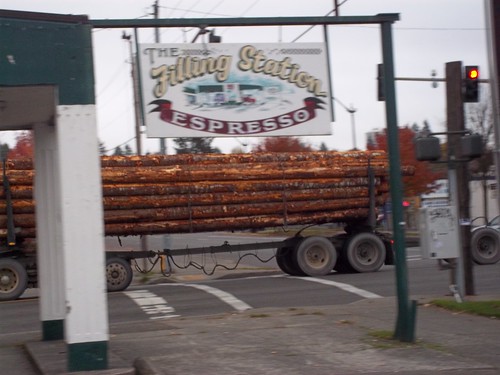
Showing posts with label industry. Show all posts
Showing posts with label industry. Show all posts
07 November 2010
27 August 2010
Great Sky
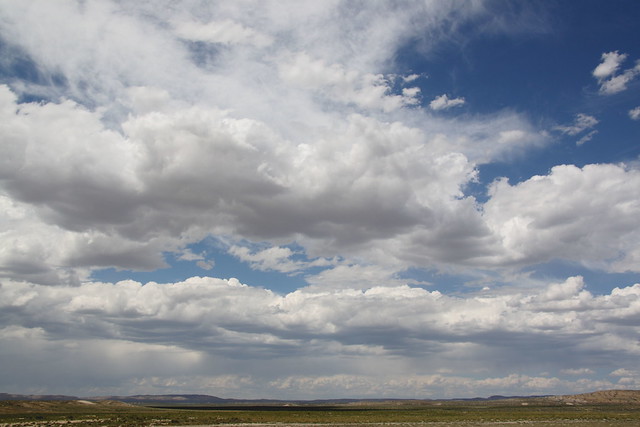
view larger
Tuesday 29 June 2010, Wyoming—There is little, if any, of the American landscape that has been left untouched by industrialization. Utility poles, mining operations, electrical generating facilities, roadways, settlements, smoke from industry: these aspects can be witnessed almost everywhere across the entire landscape.
p.s. Please come to the Cascadia Freedom Caravan Olympia report-back on the US Social Forum this Sunday the 29th, 7pm at Fertile Ground Guesthouse. more information: http://olyblog.net/cascadia-freedom-caravan-report-back-us-social-forum
12 July 2010
Ship in Port, with Ideas about Success, Materialism, Society, and Health
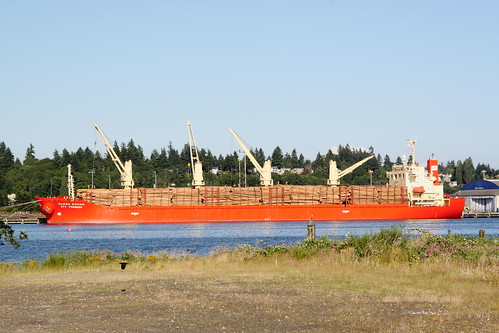
July 10, 2010
view original size
A ship carrying logs is seen at the Port of Olympia, in the City of Olympia, Thurston County, Washington State. The ship is the STX Pioneer, of Panamanian registry.
Despite the many faceted objections of environmentalists, the Weyerhauser company has teamed up with the public sector and is operating a log export operation at the Port of Olympia.
Many people who understand and care about the environment object to the activities of the Weyerhauser company. The lists of reasons is long. The objections stem at least in part because of the fact that the logging operation is harmful to ecosystems. The logging and shipping imperil the delicate biodiversity that is at the heart of ecosystem health. This goes along with a number of other reasons to object to the log export operations, including but not limited to the environmental effects from the transport of such a heavy commodity over long distances.
Should companies be allowed to engage in activities that harm the environment?
Who does the environment belong to? Or rather, who ought the environment belong to? (To some and not others? To all? To none?)
When there are harmful industrial activities, does it make more sense that some few should benefit disproportionately more than others, or does it make more sense to distribute the wealth in a way so that everyone would benefit equally?
Does the focus on a definition of success that leans on the metrics of materialism (v. spirit, or community, for example) promote a fundamentally harmful, abusive, violent relationship with the material of existence, the substance of the planet?
Is it possible that there other ways of defining success that would be more favorable toward a vision of economic stability and justice, and toward an end to what many believe is the criminal behavior of big companies?
In of the current system societies are engaged in competition to exert control over resources. Instead of this scenario, think about societies moving toward a culture of cooperation and stewardship and mutual prosperity. Think about society moving away from a culture of war, conquest and dominance.
Instead of measuring success based solely on personal material riches, perhaps success could be defined along the lines of a healthy community, on the ability to take care of each other, and to be truly aware and awake, conscious (and conscientious) in our daily lives, so that we are careful to the greatest extent possible to NOT do harm...
Perhaps success could be defined along the lines of efforts to strengthen the fabric of society, to work toward an end to all violence, and an end to all unnecessary suffering - an end to poverty, starvation, illiteracy, homophobia, sexism, ageism, racism, nationalism.
Perhaps success could be defined along the lines of contribution to the mutual health and well-being—the mutual happiness and prosperity—of all people.
Berd
06 July 2010
26 June 2010
Detroit Incinerator Protest
 Saturday, June 26, 2010, Detroit—Protest against Detroit incinerator. We were told that this is the "largest incinerator in the world." It's a privately owned for-profit company that does the job. It's called Covato, or something like that. I'll look it up and make any corrections.
Saturday, June 26, 2010, Detroit—Protest against Detroit incinerator. We were told that this is the "largest incinerator in the world." It's a privately owned for-profit company that does the job. It's called Covato, or something like that. I'll look it up and make any corrections.Also, it's hard to see smoke, but there is a nasty odor in the exhaust plume. I wonder if the particularly nasty stuff gets burned at night, or if the smoke has been cleaned up for the presence of out-of-towners with the forum this week. There was a very nasty odor when we walked downwind of the facility.
Detroit doesn't have a recycling program, so waste plastic, styrofoam and other toxics may very well be included in the waste that is burnt at the incinerator. Disgusting thought.
One organizer mentioned the concept of Zero Tolerance: There is no safe, nor allowable level for toxic emissions. Any toxins are unacceptable. For example, if the incinerator releases even one particle of dioxin, then it must be shut down. I agree. Especially if it is run for-profit.
No one deserves to profit from activities that do harm.
It was a great protest, I have a ton of photos. More later!
[more photos from the protest here: //peacepotential.blogspot.com/2010/07/more-photos-from-detroit-incinerator.html]
26 May 2010
Oil Disaster in the Gulf of Mexico
The oil disaster in the Gulf of Mexico is very bad. BP (British Petroleum) estimates 5,000 barrels a day. Independent analysts estimate that the number could be ten times that much, or more.
At 5,000 barrels a day, the amount of oil would already be 4 times as much as the Exxon Valdez disaster (which happened over 20 years ago off the coast of Alaska.)
This is not to mention the possible effects of chemical dispersants, which have been used in the recent disaster to accelerate the decay of the swirling crude.
Most of the oil that is spewing from a pressurized oil deposit deep under the surface of the water (5,000 feet deep) is not reaching the surface, due to underwater currents. No one knows what the real consequences of this disaster (consequences for ecosystems and all the life in and around the waters of the gulf, and to human lives,) will be.
One thing is for sure though. This is a big deal.
This is not to mention that according to current regulatory policies BP's liability for the disaster is capped at $75 million. The total cost of the disaster could very well exceed the $1 billion mark. I am not sure if the $1 billion estimate includes the placement of monetary value on the potential loss of life (which is extreme.)
At 5,000 barrels a day, the amount of oil would already be 4 times as much as the Exxon Valdez disaster (which happened over 20 years ago off the coast of Alaska.)
This is not to mention the possible effects of chemical dispersants, which have been used in the recent disaster to accelerate the decay of the swirling crude.
Most of the oil that is spewing from a pressurized oil deposit deep under the surface of the water (5,000 feet deep) is not reaching the surface, due to underwater currents. No one knows what the real consequences of this disaster (consequences for ecosystems and all the life in and around the waters of the gulf, and to human lives,) will be.
One thing is for sure though. This is a big deal.
This is not to mention that according to current regulatory policies BP's liability for the disaster is capped at $75 million. The total cost of the disaster could very well exceed the $1 billion mark. I am not sure if the $1 billion estimate includes the placement of monetary value on the potential loss of life (which is extreme.)
21 April 2010
Technology, Industrialization, and a Patterns of Harmful Human Behavior
 I think we can have a lot of dreams, and make the world a better place, without space exploration.
I think we can have a lot of dreams, and make the world a better place, without space exploration.I really appreciate, and like, some technologies. But I think we have to start questioning and increase our awareness of the effects of these technologies. I think we have to question whether many of these technologies are really making our lives better, and whether there are any harmful side-effects, and whether the side-effects are "worth it."
Instant communications for example. What exactly is the benefit of being able to communicate instantly? There are obvious implications in the financial sector, and in terms of efforts toward economic domination. But economic domination is wrong. It is bad.
Look at the effect of industrialization on the environment. Hundreds of thousands of species driven to extinction by human activities. Climate change, climate disruption, global warming, ocean acidification. You name it. The list is long.
The problem is that human beings have been doing harm for a long time. I believe it is wrong for human beings to hurt each other. I believe it is wrong for human beings to hurt the environment. When we hurt the environment we hurt each other.
When we add industrialization and technology into the mix of harmful/abusive/violent patterns of human behavior, then we get a dangerous and highly undesirable mix.
Does technology really make life better for all of us? Or does it only seem to make life better? Are there harmful consequences that we are unaware of?
Does technology make life considerably worse for some of us? Consider the effect of gun technology. Consider the effect of extractive technologies on miners around the world - and on the environment.
I think there is a very strong argument that technology actually has made life worse for all, or at least many, of us, in many ways!
I prefer a cooperative, caring, kind and compassionate social ethic, rather than one rooted in dominance and oppression, violence, cruelty, hate and fear.
Love and Harmony!
Cheers,
Berd
07 April 2010
War Taxes and War Profits
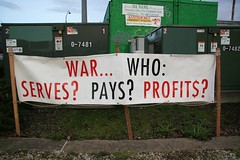 In the USA, almost half of collected income taxes are used to support the military industrial complex. I think that such militarism is wrong, i.e. morally incorrect.
In the USA, almost half of collected income taxes are used to support the military industrial complex. I think that such militarism is wrong, i.e. morally incorrect.And as if such an expenditure on the military is not bad enough, to add insult to injury: some people are actually profiting off of the sales of military and war related products and functions.
And as if that's not bad enough, the wars our government are engaged in are not even defensive!
The body politic is paying for (is subsidizing) profits reaped from what are essentially imperial ventures, wars of profit. I think that is just plain wrong (as well as basically disgusting, in the sense of offensive.) War is the worst violence. And aggression is the worst crime, because in aggression therein cumulatively lie all manner of harm and violence.
I believe that no one deserves to profit from war. And indeed, that no one should profit from war (nor any other harmful economic activity.) What do you think?
Please inform your lawmaking representatives, at all levels of gov't, of your beliefs on this matter.
Also, on tax day in Olympia, Washington there will be War Tax Resistance Leafletting. There might be similar efforts in your neck of the woods.
Peace,
Berd
p.s. I have a letter published in today's (Thursday, April 8) edition of The Olympian newspaper: April 8, 2010 Letters to the Editor | The Olympian
02 March 2010
Morning Scene
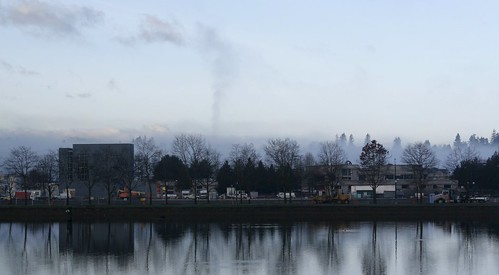
Wednesday February 17, 2010
This is in Olympia Washington. The source of the smoke is likely the Sewage treatment plant.
view larger: smoker
26 February 2010
15 February 2010
Subscribe to:
Posts (Atom)



